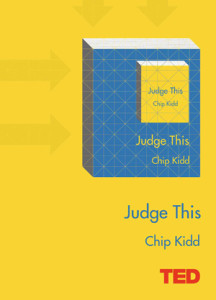 JUDGE THIS (PART OF TED BOOKS)
JUDGE THIS (PART OF TED BOOKS)
Chip Kidd
Simon & Schuster, June 2015, RRP $16.99
Design surrounds our day-to-day lives; from the clothes we wear, to the tools we use, to the advertising that tries to sell us more clothes to wear and tools to use. As I type this article, I use a computer that has included stages of design for hardware, operating system and word processing software, all to allow the simple task of writing a review while sitting on the couch in my tracksuit pants (an important part of the writing process).
However, while design surrounds us, it can still be quite flawed, as anyone who has tried to use a modern can opener without instructions can attest. Of course, Chip Kidd, renowned book designer and author of Judge This, wouldn’t have you passively accept the good and bad of design in the world. Instead, he advocates that we do exactly what the title of his book suggests, and judge, with a critical eye, those objects we experience every day.
Judge This is a walking tour through the gaze of Chip Kidd. We follow his steps as he wakes up in the morning (stopping to admire his vintage shaver), travels through the city (appreciating how scribbles of graffiti make advertising interactive), and then onto work (glorying in the supreme efficiency of the bulldog clip). Everything that the eye sees is a touchstone of wonder and may be converted, reshaped and reformed into use for a cover or logo.
Kidd shows us designs that he loves, but also designs that he doesn’t. All design, he argues, exists on a continuum between clarity and mystery. The key is to know when to use what. And when design sits in the wrong place of the continuum, that’s when we have issues. Melbournians experience a particularly egregious example of misplacement on the clarity/mystery spectrum when it comes to the Myki ticketing machines. A process that should have absolute clarity is instead mysterious and frustrating. It’s disappointing as a user to know that something that is integral to everyday life has been designed so poorly. But we can take it as an opportunity to understand why designs sometimes don’t work, and so make better choices when creating our own contributions to everyday design.
Chip Kidd, as a designer of books, understands that design is all about first impressions. We’re told as readers to not judge a book by its cover, but what they mean is to not judge a story by its cover. So perhaps we can judge the cover as a thing in itself. We don’t actually buy stories; we buy books. And books are stories wrapped in a cover that, when done well, enriches the experience of reading by providing an anchor in the real world, a part of the story that has escaped imagination and exists next to our bed as mist. Part of the pleasure of Judge This is the beautifully compact hardcover format that is the book’s presentation. How much nicer is it to hold a story we love as a richly designed object?

